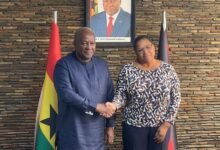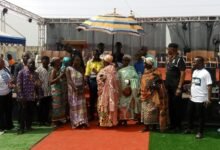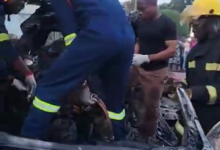
South Africa’s KwaZulu-Natal province is still reeling from the country’s worst floods in 60 years, which killed about 435 people last month.
Mass funerals are taking place, although many families are still unable to bury their loved ones because their bodies were swept away by the raging torrents, as the BBC Pumza Fihlani reports.
Inside a white tent on a hillside just outside Pietermaritzburg, hundreds of people sit with their heads bowed before six coffins. A sombre church hymn pierces through the heavy silence.
The unimaginable happened to the Mdlalose family. Slindile Mdalose, 43, and nine children aged between two and 10 years were killed in the floods that devastated KwaZulu-Natal in the most deadly natural disaster in the country’s history.
They were sleeping when the violent water washed through, flattening their home. It has been three weeks and some of the bodies are yet to be recovered
“To tell you the truth we are mad, we are numb. We can’t use our heads. This is too much to even comprehend,” the children’s uncle, Thokozani Mdlalose tells the BBC.
He is wearing tinted glasses to conceal his pain but his cracking voice and quivering lip betray his struggle to keep his composure.
“When you have to split your grief, you think of this one, you think of that [one]. It’s too much. It’s hard losing one person. It’s worse losing two. Ten is something else,” he says.
The mass funeral of Slindile Mdalose and her five children – Uyanda, Lubanzi, Ziyanda, Asanele, and Lulama – took place on a cool morning. She was also the aunt of four more children, who are still missing.
“Knowing that we haven’t found them that they might be decomposing somewhere out there – words can’t describe what is inside me right now. I can’t even gather my thoughts,” Mr Mdlalose says.
He adds that the nine children were playful and full of laughter, and brought joy to the whole family.
Their aunt, Nonkululeko Mdlalose, says when she last spoke to her sister on the phone just hours before they died, she could tell that her sister was afraid.
It was raining heavily, unlike anything either of them had ever seen before. Still, they did not expect that it would lead to disaster, Nonkululeko Mdlalose says. -BBC








